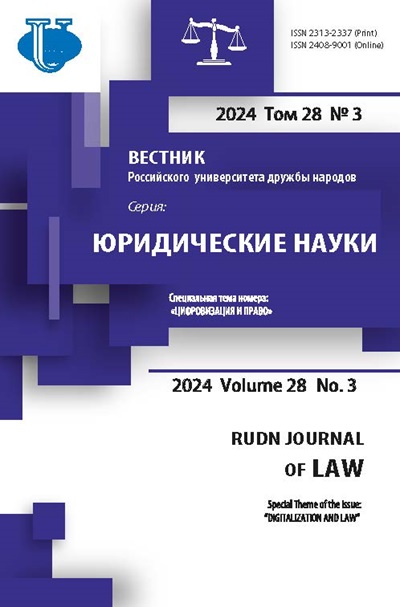Engaging a specialist for the investigation of cryptocurrencies in criminal, civil and arbitration proceedings
- Authors: Garmaev Y.P.1, Osipov G.P.2,3
-
Affiliations:
- Dorji Banzarov Buryat State University
- Krasnoyarsk State Agrarian University
- Joint-Stock Company «Shard»
- Issue: Vol 28, No 3 (2024): DIGITALIZATION AND LAW
- Pages: 669-684
- Section: PROCEDURAL LAW. PROSECUTOR SUPERVISION
- URL: https://journals.rudn.ru/law/article/view/40942
- DOI: https://doi.org/10.22363/2313-2337-2024-28-3-669-684
- EDN: https://elibrary.ru/INHHRE
- ID: 40942
Cite item
Full Text
Abstract
The spread and use of cryptocurrencies (digital currency) in Russia and globally is increasing significantly every year. As the cryptocurrency market has grown, its criminal component has also grown at the same time. The number and degree of public danger of crimes where cryptocurrency acts as an object, aim or means of crime is steadily increasing. Civil and arbitration disputes over cryptocurrencies are also on the rise. Consequently, there is an objective need to effectively protect the interests of victims from criminal offenses, investigate relevant crimes and resolve disputes. Addressing these issues is impossible without the assistance of cryptocurrency specialists. The article formulates a definition of cryptocurrency crime, analyzes the challenges of using cryptocurrencies, ranging from the incomplete regulatory framework of its circulation to the lack of expertise among most practicing lawyers. It investigates and summarizes the conflicting practices in terms of requirements for cryptocurrency specialists, their conditions and procedure of their involvement in various legal proceedings. The prevalence of incompetence and dishonesty among individuals and companies offering services in the crypto market is noted, and appropriate warnings are put forth. The study systematizes and describes typical criminal, investigative and judicial scenarios where the expertise of a cryptocurrency specialist is necessary. It also provides conclusions and recommendations on organizing and strategizing interaction with cryptocurrency specialists in the interests of victims (including organizations), investigative authorities and/or the court. The conclusion summarizes the roles of cryptocurrency research specialists in various stages and legal proceedings (criminal, civil and arbitration) from oral and written consultations, preparation of specialist opinions to participation in investigative actions, court hearings and negotiations between conflicting parties. The research incorporates both general and specific scientific methodologies such as system-structural analysis, formal-logical extrapolation, document analysis, statistical analysis, prognostic and interviewing techniques.
About the authors
Yury P. Garmaev
Dorji Banzarov Buryat State University
Author for correspondence.
Email: garmaeff@mail.ru
ORCID iD: 0000-0001-5431-8063
SPIN-code: 9555-5164
Doctor of Legal Sciences, Full Professor, Professor of the Department of Criminal Law, Procedure and Criminalistics, Institute of Law and Economics
24 «a» Smolina str., Ulan-Ude, 670000, Russian FederationGrigory P. Osipov
Krasnoyarsk State Agrarian University; Joint-Stock Company «Shard»
Email: grigory.osipov@shard.ru
ORCID iD: 0009-0007-9626-6901
external doctoral candidate, Krasnoyarsk State Agrarian University; Director of Investigations, Shard Joint Stock Company
30/9, Novy Arbat street, Moscow, 121099, Russian FederationReferences
- Duhani, S., Baggili, I., Raymond, D. & Marchry, R. (2023) The current state of cryptocurrency forensics. Forensic Science International: Digital Investigation. 46, 1-11. https://doi.org/10.1016/j.fsidi.2023.301576
- Galushin, P.V. & Karlov, A.L. (2017) Information about transactions with cryptocurrencies (using bitcoin as an example) as evidence in a criminal case. Scientific notes of the Kazan Law Institute of the Ministry of Internal Affairs of Russia. 2(4), 90-100. (in Russian).
- Gvozdeva, I.S. (2008) The use of special knowledge in the investigation of group mercenary and violent crimes of minors. Diss … cand. Legal of sciences. Krasnodar, Kuban State Agrarian University. (in Russian).
- Holmes, A. & Buchanan, W. (2022) A framework for live host-based Bitcoin wallet forensics and triage. Forensic Science International. (44), 1-18. https://doi.org/10.1016/j.fsidi.2022.301486
- Kutera, M. (2022) Cryptocurrencies as a subject of financial fraud. Journal of Entrepreneurship, Management and Innovation. 18(4), 45-77. https://doi.org/10.7341/20221842
- Lavrov, V.P. & Sidorov, V.E. (1989) Investigation of crimes in hot pursuit: a textbook. Moscow, Higher Law Correspondence School Publ. (in Russian).
- Lazareva, L.V. (2011) Conceptual foundations of the use of special knowledge in Russian criminal proceedings. Diss … doct. Legal of sciences. Vladimir, Law Institute of the Federal Penitentiary Service. (in Russian).
- Nesmeyanov, A.A. (2021) About some features of the investigation of crimes related to the use of cryptocurrency. Education and law. (9), 386-390. https://doi.org/10.24412/2076-1503-2021-9-386-390 (in Russian).
- Park, A., Hyejin, R., Park, W. & Jeong, D. (2023) Forensic investigation framework for cryptocurrency wallet in the device. Computers & Security. 133(2), 103392. https://doi.org/10.1016/j.cose.2023.103392
- Perov, V.A. (2017) Identification, qualification and organization of investigation of crimes committed using cryptocurrency: a textbook. Moscow, Yurlitinform Publ. (in Russian).
- Pinkevich, T.V. (2021) Prevention of crimes committed in the sphere of circulation of digital currency (cryptocurrencies). The rule of law: theory and practice. 4(66), 82-96. https://doi.org/10.33184/pravgos-2021.4.5 (in Russian).
- Semenov, E.A., Vasyukov, V.F. & Volevodz, A.G. (2020) Legal status and legal regulation of a specialist's participation in criminal proceedings: theoretical, procedural and organizational aspects: monograph. Moscow, Prospect Publ. (in Russian).
- Shapiro, L.G. (2008) Special knowledge in criminal proceedings and their use in the investigation of crimes in the field of economic activity. Diss … doct. Legal of sciences. Krasnodar, Kuban State Agrarian University. (in Russian).
- Sidorenko, E.L. (2018) Crypto Crime as a New Criminological Phenomenon. Society and law. (2), 15-21. (in Russian).
- Titov, A.A. & Vasyukov, V.F. (2023) Procedural and tactical problems of seizure of electronic media and copying of information in the investigation of crimes using cryptocurrency. The Russian investigator. (2), 23-27. https://doi.org/10.18572/1812-3783-2023-2-23-27 (in Russian).
- Trozze, A., Kamps, J. & Akartuna, E.A. (2022) Cryptocurrencies and future financial crime. Crime Science. 11(1), 1-35. https://doi.org/10.1186/s40163-021-00163-8
- Tziakouris, G. (2018) Cryptocurrencies - A Forensic Challenge or Opportunity for Law Enforcement? An INTERPOL Perspective. IEEE Security & Privacy. 16(4), 92-94.
- Watters, C. (2023) When Criminals Abuse the Blockchain: Establishing Personal Jurisdiction in a Decentralised Environment. Laws. 12(2), 33.
- Zajac, D. (2019) Criminal Jurisdiction over the Internet: Jurisdictional Links in the Cyber Era. Cambridge Law Review. 4, 1-28.
Supplementary files















